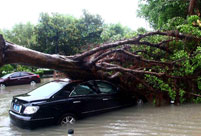The 21st APEC Economic Leaders' Meeting has just taken place in Bali, Indonesia.
World economic recovery was the keynote of the event.
Under the theme of “Resilient Asia Pacific, Engine of Global Growth”, the leaders of different states discussed the Bogor Goals, sustainable and fair growth, and the interconnection of the Asia-Pacific region.
The summit also focused on the integration of the regional economy, multilateral trading systems, and structural economic reform. All these topics are challenges that the region is facing at present, and will have a bearing on long-term development.
The U.S., China and Japan, the three largest economies in the world, are all located in Asia-Pacific, the most dynamic region in the world. Distinct from G8 and G20, APEC is playing an essential role in world economic development.
Since its establishment, APEC has made significant progress in the liberalization of regional and global trade and investment as well as economic and technological cooperation, said Liu Xuecheng, a Chinese scholar on Sino-US relations.
A proposal to establish a free trade zone under the APEC framework featured on the agenda. Liu added that if this plan is realized, Asia-Pacific will become the center of world trade and investment. The Atlantic-centered world economic fulcrum will be replaced by a new one centered around the Pacific.
APEC to play a particular role
Statistics indicate that the Asia-Pacific region has a total population of 2.7 billion. Its economic aggregate accounts for 60 percent of the world total, and its trade volume accounts for 50 percent. Against the international backdrop of economic recovery, APEC has a distinctive role in comparison with G8, G20, and TPP among other mechanisms and organizations.
In recent years, the U.S. has been advocating the Trans-Pacific Partnership (TPP), with the aim of containing the rise of China. Liu pointed out that the purpose of TPP is to establish an U.S.-led Asia-Pacific economic and financial structure whose objective is to undermine the economic integration of the region, and especially the free trade zone proposed by ASEAN.
TPP, which has been presented as the model of the 21st century’s free trade zones, is inappropriate to the economic development and social sustainability of the developing countries in the Asia-Pacific region. However, APEC's objectives, themes, operating mechanism and principles take into account the interests of both developed countries and developing ones, which works to the benefit of and grants equal status to all Asia-Pacific nations.
In 2013 China is poised to become the country with largest trade volume in the world. The inviting potential of China’s enormous market makes it impossible to overlook China in the long-term strategy of the Asia-Pacific nations. In APEC, China would have a voice and the opportunity to build a sound strategy, said He Maochun, professor of the Economic Diplomacy Research center of Tsinghua University.
Asia-Pacific should promote economic integration
With regard to the future development of APEC, He Maochun believes that Asia-Pacific is a platform with multiple systems, civilizations and values. The region should set an example in terms of the fusion of diverse civilizations, rather than becoming a flashpoint or a regional battlefield.
Asia-Pacific is rich in resources and has a huge internal market. This region has the potential to make a substantial contribution to human progress and economic development. The Pacific Ocean is the largest ocean in the world. Every effort should be addressed to both sustainable development and free trade - specifically prohibiting the dumping of all waste into the ocean. Cooperation in limited areas can subsequently be extended to broader areas, under the principle of non-discrimination, to achieve the integration of the Asia-Pacific region.
China should actively promote negotiations for a free trade zone under the APEC framework. Using this platform as a base, China can progressively integrate other regional economic cooperation organizations to progress the overall integration of the Asia-Pacific economy.
Edited and Translated by Yao Chun, People's Daily Online
Read the Chinese version: 亚太不应是“文明冲突”角斗场, source: People's Daily Overseas Edition
 2013 Colour Me Rad 5K run held in Canada
2013 Colour Me Rad 5K run held in Canada China's destroyer Qingdao sails out of Sydney Harbor
China's destroyer Qingdao sails out of Sydney Harbor Chinese tycoon aims to restore London's Crystal Palace
Chinese tycoon aims to restore London's Crystal Palace Typhoon Fitow affects 4.56 million people in east China
Typhoon Fitow affects 4.56 million people in east China Game for the brave: 'Spiders' in Yandang Mountains
Game for the brave: 'Spiders' in Yandang Mountains Travel peak witnessed on last day of National Day holiday
Travel peak witnessed on last day of National Day holiday  New couples take wedding photos during holiday
New couples take wedding photos during holiday Serena Williams stumbles through to quarterfinals
Serena Williams stumbles through to quarterfinals Thailand Mobile Expo 2013 kicks off
Thailand Mobile Expo 2013 kicks off Photo collection of Chinese Navy
Photo collection of Chinese Navy Dense haze envelops N China
Dense haze envelops N China Twins Culture Festival kicks off in Beijing
Twins Culture Festival kicks off in Beijing UNESCO world heritage site: Montale Tower
UNESCO world heritage site: Montale Tower Israeli drone crashes into Mediterranean, fragments recovered
Israeli drone crashes into Mediterranean, fragments recovered Serena Williams wins second China Open title
Serena Williams wins second China Open titleDay|Week|Month